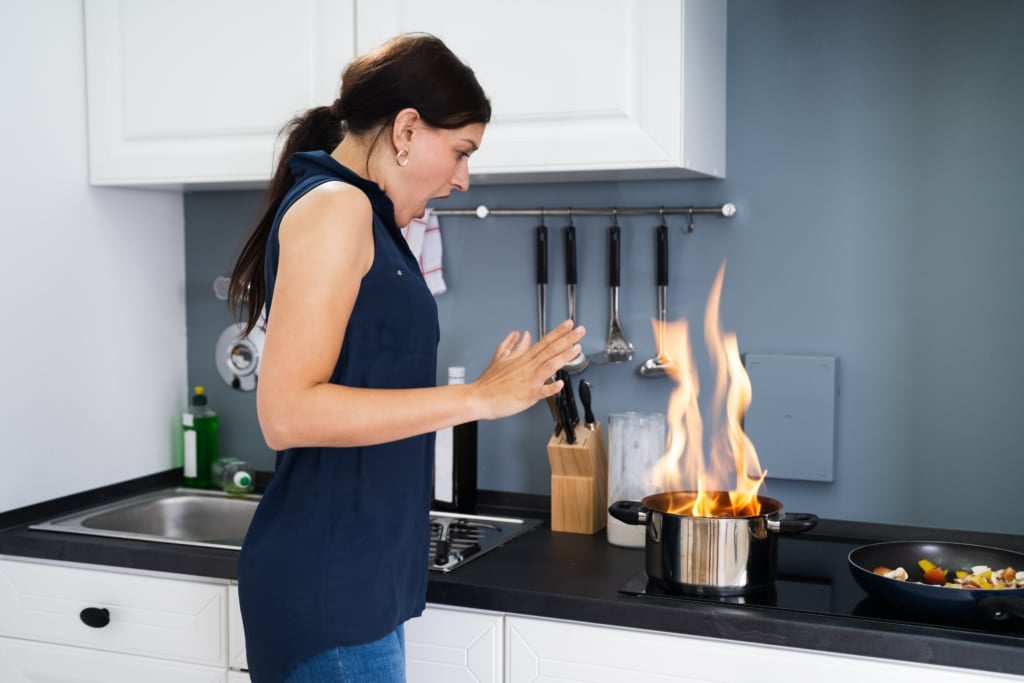How to Prevent a Kitchen Fire

Whether you’re a student living in dorms or a young professional living in your own apartment, you’ll likely be spending more time in the kitchen. While cooking is exciting and fulfilling, it can also pose a danger, particularly if you’re not careful. According to the National Fire Protection Association (NFPA), cooking accidents are responsible for more than half of all home fires reported.
In this blog post, we’ll share essential kitchen fire prevention tips that will help you stay safe while cooking.
Fire Prevention Tips
Stay Alert
One of the most crucial kitchen fire prevention tips is to always stay alert while cooking. You should not leave your food unattended. It’s easy to get distracted, but even a few seconds can be the difference between a safe meal and a kitchen fire.
Keep the Area Clean and Clutter-Free
A cluttered kitchen can be a recipe for disaster. Make sure to keep your counters and cooking surfaces clean so there are no stray papers, towels, or other flammable materials around that could catch on fire. Also, keep your cooking area free from grease buildup, which is a common cause of kitchen fires.
Use the Right Oil and Temperature
Cooking oil has a flash point at which it can ignite, so it’s essential to use the right type of oil and temperature. When frying, use oils with a high smoke point, such as canola, peanut, and vegetable oils, to avoid a grease fire. Always start with a lower temperature and slowly heat up the oil if needed.
Keep a Fire Extinguisher Close By
A fire extinguisher is your first line of defense against kitchen fires. Make sure you have one in your kitchen and know how to use it. Be familiar with the types of extinguishers and their uses. Remember, a fire extinguisher is not a substitute for calling 911.
Be Cautious When Using Appliances
Before using any kitchen appliance, read the instructions and follow them carefully. Do not overload sockets or use damaged appliances. Keep your appliances clean, and do not let them run unmonitored. Unplug appliances when they are not in use to prevent overheating and fires.
Install Smoke Detectors
Smoke detectors are vital tools that can alert you to fires and give you time to evacuate your home safely. Install smoke detectors in or near your kitchen and test them regularly to ensure they’re functioning correctly.
Avoid Wearing Loose Clothing While Cooking
Avoid wearing loose or baggy clothing, especially long sleeves, while cooking. Loose clothing can easily drape over stove burners and catch fire. To ensure safety, wear short, tight-fitting sleeves when cooking or roll up your long sleeves securely. It’s also advisable to avoid wearing highly flammable synthetic fabrics and instead opt for materials such as cotton.
What to Do if There Is a Kitchen Fire
Attempt to Extinguish the Fire (ONLY If It Is Safe to Do So)
In the unfortunate event of a kitchen fire, it’s crucial to respond quickly and calmly. The first step is to assess the type of fire. For a small grease or electrical fire, you can try to extinguish it using the proper type of fire extinguisher, respectively.
Evacuate and Call 911
Always remember that your safety and the safety of others should be your primary concern. If a fire gets out of control, evacuate the building immediately and call 911. It is better to be safe than sorry!
Don’t Use Water
Never use water to put out a kitchen fire; it can react with the fat and oil, causing a dangerous flare-up. Instead, try to smother the fire by covering it with a metal lid or another larger pan if it is safe to do so.
Keep Appliance Doors Shut
If the fire is in the oven or microwave, keep the appliance door shut and turn off the heat. This will help to contain the fire.
Final Thoughts
In conclusion, kitchen fires are preventable if you follow some simple steps. The above tips are the most important ones to remember, but keep in mind that kitchen fire safety is more about common sense and awareness than anything else.
Cooking accidents can happen to anybody, but by paying attention, taking precautions, and practicing fire safety, you can minimize the risks and keep your kitchen and living space fire-free!



